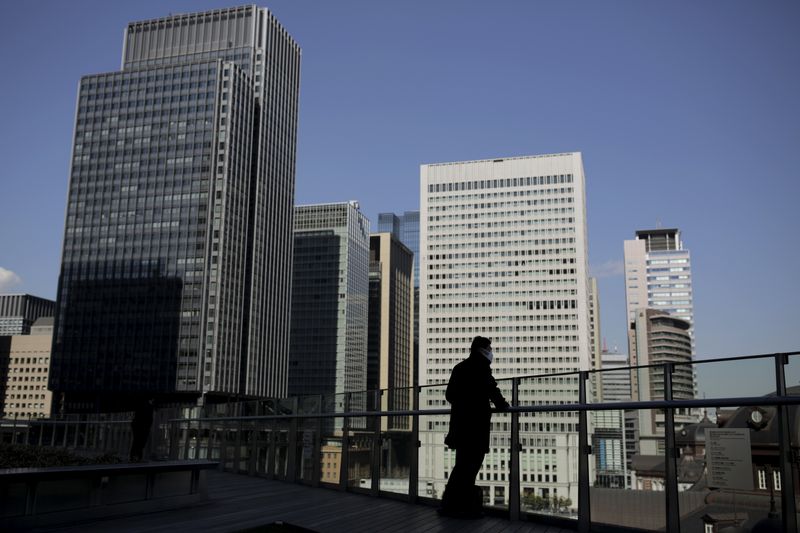By Summer Zhen
HONG KONG (Reuters) - Asia-focused hedge funds started 2024 with a strong first quarter, cashing in on a prolonged rally in Japanese stocks, a tentative turnaround in Chinese equities, and a boom in artificial intelligence (AI) stocks.
Most stock markets across Asia - from Japan and India to mainland China - ended the first quarter higher, as expectations for U.S. interest rate cuts lifted global equities.
Hedge funds that use an Asian equities long/short strategy rose 2.9% in the first quarter, according to data from Eurekahedge.
A long/short strategy involves the fund buying and holding stocks it thinks will rise in value, known as taking a long position, while selling shares it has borrowed for equities it expects will decline in value, known as taking a short position.
Asia-focused multi-strategy hedge funds that invest in different asset classes such as equities and commodities posted a 3.7% return, Eurekahedge data as of April 16 showed.
Pan-Asia funds with exposure to Japan rose broadly for the first three months of 2024, according to investors. Panview Asian Equity Fund, run by former Goldman Sachs partner Ryan Thall, jumped 15.5%, taking its assets under management to more than $1 billion, according to a source who received data on the fund's performance.
Singapore-based FengHe Group saw its $3.3 billion Asia Fund return 6.6% for the first quarter, after a 9.2% gain for 2023, said the source.
Spokespersons for Panview and FengHe confirmed their performance.
The Nikkei share index rose to a record last month and jumped 21% in the first quarter alone, led by signs the world's fourth-largest economy is emerging from deflation and companies are taking steps to improve governance. Eurekahedge data shows Japan-focused equity hedge funds were up 5% during the period.
“Equity long-short and multi-manager platforms have benefited from strong markets such as Japan and India,” said Benjamin Low, a senior investment director at global investment advisory firm Cambridge Associates.
NIMBLE IN CHINA
Even some China-focused hedge funds were able to ride the volatility and post decent returns.
Chinese stocks have stabilised since February, after three consecutive years of steep losses, as the country's securities regulator intervened with steps to stem selling. The benchmark MSCI China index has bounced 10% since Jan. 22.
Investing in procyclical sectors ranging from energy to industrial, as well as internet and high-yield stocks, has led to outperformance, according to investors.
Betting on Chinese food delivery giant Meituan helped Hong Kong-based First Beijing yield returns of 6.3%, according to a source who was briefed on its performance.
Some hedge funds benefited from bullish wagers on the AI supply chain across the U.S., Taiwan, and mainland China. Grand Alliance Asset Management’s Sino Vision Market Neutral Fund notched a 6.1% net gain for the first quarter, with a majority of returns driven by AI-related trades, the fund reported.
“We believe we are in the early innings of AI and we have already seen proven ROI (return on investment) across various end markets,” a spokesperson for Grand Alliance said in an email.
Multi-manager hedge funds leaning towards equities also had a good start. Infini Capital Management's, Dymon Asia's, and Pinpoint Group's multi-strategy funds posted 7.6%, 6.5% and 4% gains, respectively, the funds said.
The biggest losers of the quarter were China's quantitative hedge funds, which were hit by the regulatory crackdown in February that imposed trading restrictions and forced them to adopt new styles of trading.
Jupiter Tactical Trading Fund, which is related to Shanghai Minghong Investment Management, and the overseas quantitative funds of Ubiquant, both recorded double-digit losses in the first quarter, said two investors who received data on the funds' performance.
Jupiter did not reply to a request seeking comment. First Beijing and Ubiquant declined to comment.
Asia Hedge Funds Q1
performance
FengHe Asia 6.6%
Panview 15.5%
Kaizen Capital Partners 5%
Greenwoods - Golden China Fund 8.4%
Keystone 10.8%
Golden Pine 7.8%
First Beijing 6.3%
Golden Nest 3%
Grand Alliance - Sino Vision 6.1%
Market Neutral Fund
Pinpoint - Multi-Strategy Fund 4%
Segantii Asia-Pacific Equity 2.5%
Multi-Strategy Fund
Infini Global Fund 7.6%
Dymon Asia - Multi-Strategy 6.5%
Investment Fund
Sources: investors, newsletters and prime brokers

Kaizen, Greenwoods, Segantii did not reply to requests seeking comment; Keystone, Golden Pine, First Beijing, Golden Nest declined to comment.
(This story has been refiled to fix the table)